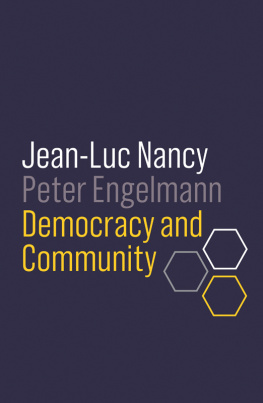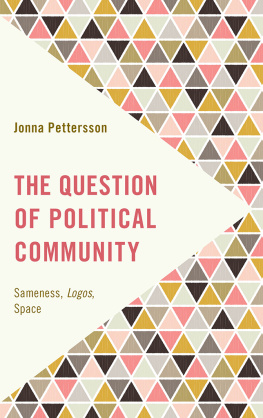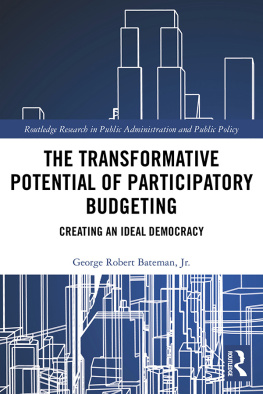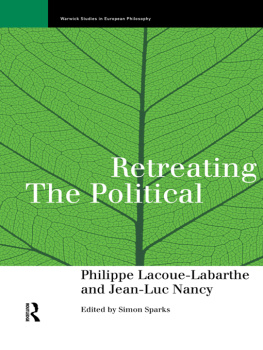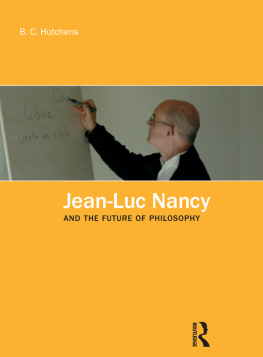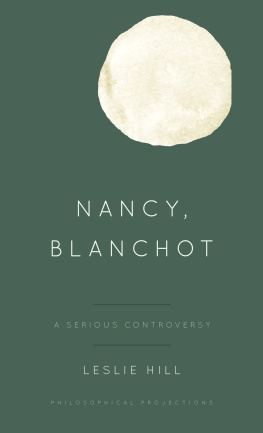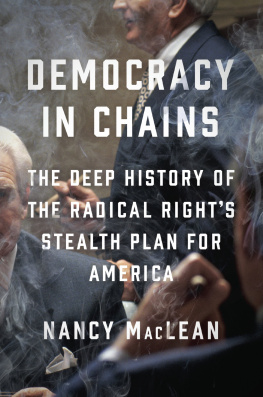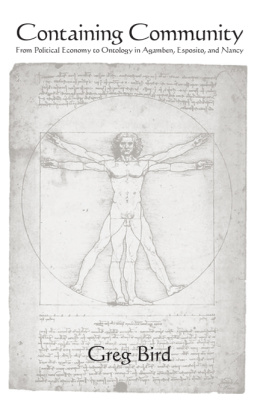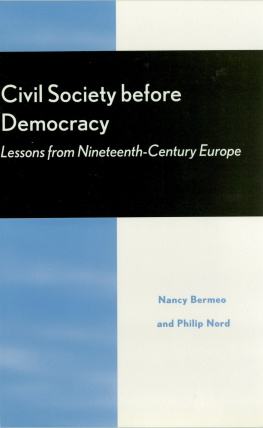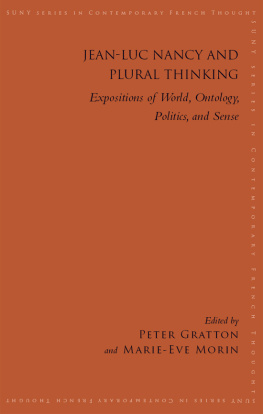
Democracy and Community
Jean-Luc Nancy
Peter Engelmann
Translated by Wieland Hoban
polity
Copyright page
First published in German as Demokratie und Gemeinschaft 2015 Passagen Verlag, Ges. M.b.H, Vienna. English language edition published by arrangement with Eulama Lit. Ag.
This English edition Polity Press, 2019
Author photo on p.vi Passagen Verlag
Polity Press
65 Bridge Street
Cambridge CB2 1UR, UK
Polity Press
101 Station Landing
Suite 300
Medford, MA 02155, USA
All rights reserved. Except for the quotation of short passages for the purpose of criticism and review, no part of this publication may be reproduced, stored in a retrieval system or transmitted, in any form or by any means, electronic, mechanical, photocopying, recording or otherwise, without the prior permission of the publisher.
ISBN-13: 978-1-5095-3534-7 (hardback)
ISBN-13: 978-1-5095-3535-4 (paperback)
A catalogue record for this book is available from the British Library.
Typeset in 12.5 on 15pt Adobe Garamond
by Fakenham Prepress Solutions, Fakenham, Norfolk NR21 8NL
Printed and bound in Great Britain by CPI Group (UK) Ltd, Croydon
The publisher has used its best endeavours to ensure that the URLs for external websites referred to in this book are correct and active at the time of going to press. However, the publisher has no responsibility for the websites and can make no guarantee that a site will remain live or that the content is or will remain appropriate.
Every effort has been made to trace all copyright holders, but if any have been overlooked the publisher will be pleased to include any necessary credits in any subsequent reprint or edition.
For further information on Polity, visit our website: politybooks.com

I
Rethinking the Political
Peter Engelmann: Id like to start our conversation with your biography. Id like to trace the development of your thought and your philosophical positions by looking at your intellectual career. What concrete historical experiences have played a part here, what are your central philosophical reference points? So, you moved to Paris to study philosophy there ...
Jean-Luc Nancy: Yes, I came to Paris in 1959 and studied at the Sorbonne from 1960 to 1964.
Peter Engelmann: You wrote your thesis under Ricurs supervision, and then you became his assistant. What significance did Ricur have for you?
Jean-Luc Nancy: No, no, Ricur was my doctoral supervisor but I was never his assistant; things didnt turn out like that. In 1964 I passed the agrgation, which was the entrance examination for prospective teachers, and, because back then one could choose the city where one wanted to teach, I chose Strasbourg, as I wanted to study theology too. Strasbourg is the only place in France where the public university has a theology department. This is connected with the fact that Alsace-Lorraine didnt belong to France in 1905, when the strict separation of church and state was implemented there. The concordat of 1801 applies to this day in Alsace. At any rate, I didnt get a position in Strasbourg, but I did find a very good one in Colmar, and so I started teaching in Colmar in the autumn of 1964 and studied theology in Strasbourg at the same time. But I realized very soon that the theology course was very weak and completely uninteresting, so I soon abandoned it. But I had made connections at the university, and one day I was asked if Id be interested in giving lectures on structuralism. Structuralism was considered the new thing, but people didnt know anything about it outside Paris. In addition to that, I also did a seminar on Hegel. And there was actually no one at the university in Strasbourg at the time who was familiar with Hegel, so they asked me, as Id already occupied myself quite intensively with Hegels philosophy; it had also been one of the subjects for the agrgation examination.
Peter Engelmann: So, in terms of your intellectual context, you would have belonged more in Paris than in Strasbourg. What factors led you to stay there?
Jean-Luc Nancy: Well, first of all, as I said, I wanted to study theology; then there were the courses offered at the university; and finally, of course, meeting Philippe Lacoue-Labarthe also played a part. He came to Strasbourg in 1967, we got acquainted through Lucien Braun. Braun had the idea that one should bring Philippe and me together, that something could come about from that. And he was right! As it turned out there were many shared affinities, such as Heidegger, but most of all Derrida. And situationism. In the mid-sixties Strasbourg was the city of the situationists; not the core circle around Guy Debord, but many had come to Strasbourg to attend Henri Lefebvres lectures; his critique of bourgeois society was very popular at the time. In 1966 they wrote a little pamphlet, On the Poverty of Student Life, which was very well written, in the style of Debord, and handed it out at the official opening of the semester, a ceremony attended by all the professors. There was a scandal! But I didnt actually witness it directly, as I was doing my military service at the time.
Peter Engelmann: How long did you have to serve in the army?
Jean-Luc Nancy: Just for a year; I taught at the military school in Strasbourg. That was where people went to do their A-levels, or, if they were already in the army, to attend the military academy in Saint-Cyr directly afterwards. Normally the academy only admits candidates who have attended preparatory classes at university, but one can also work ones way up from the army. I was teaching philosophy to the A-level students and cultural subjects to the officer cadets.
Peter Engelmann: I dont think theres any such emphasis on a comprehensive cultural education at higher military schools in Germany or Austria.
Jean-Luc Nancy: Well, in France one expects a certain level of culture, at least from the higher-ranking officers. Certainly, they all had to take A-levels, and philosophy was one of the subjects. Naturally, teaching philosophy at a military school was a slightly peculiar affair. One time I had selected a text by Marx for an examination, and the captain had to be informed of the exam topics in advance. I was promptly summoned by the colonel, who said, Nancy, I cant allow that. A text by Marx at a military school! I replied, But Colonel, read the text, its an analysis of society! to which he answered, Nonetheless, its impossible. Another time, Esprit wanted to arrange a discussion between Althusser and me after I published an article about Althusser in that journal. So, I needed permission to travel to Paris for two days. But the colonel said at the time, You see, a discussion with Althusser, a member of the communist party, I cant allow that.
Peter Engelmann: Not even a discussion!
Jean-Luc Nancy: A month or two later my grandmother, the mother of my father, passed away. So I went to the colonel again. And this time I naturally received permission to go to Paris for a few days for the funeral.
Peter Engelmann: Let me recapitulate briefly: you went to Colmar in 1964 and taught there, and in 1966 you spent a year at the military school in Strasbourg.
Jean-Luc Nancy: Yes, in 1967 I taught in Colmar again and worked at the university in Strasbourg at the same time, but that was just the course on Hegel.
Next page
